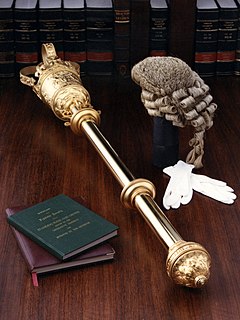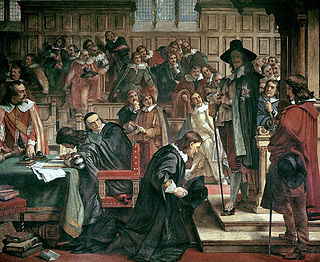Related Research Articles

The House of Lords, formally The Right Honourable the Lords Spiritual and Temporal of the United Kingdom of Great Britain and Northern Ireland in Parliament assembled, also known as the House of Peers, is the upper house of the Parliament of the United Kingdom. Membership is by appointment, heredity or official function. Like the House of Commons, it meets in the Palace of Westminster in London, England.

The House of Commons is the lower house of the Parliament of the United Kingdom. Like the upper house, the House of Lords, it meets in the Palace of Westminster in London, England.

The Parliament of the United Kingdom is the supreme legislative body of the United Kingdom, the Crown Dependencies and the British Overseas Territories. It alone possesses legislative supremacy and thereby ultimate power over all other political bodies in the UK and the overseas territories. Parliament is bicameral but has three parts, consisting of the sovereign (Crown-in-Parliament), the House of Lords, and the House of Commons. Both houses of Parliament meet in separate chambers at the Palace of Westminster in the City of Westminster, one of the inner boroughs of the capital city, London.

The Palace of Westminster serves as the meeting place for both the House of Commons and the House of Lords, the two houses of the Parliament of the United Kingdom. Informally known as the Houses of Parliament, the Palace lies on the north bank of the River Thames in the City of Westminster, in central London, England.

A ceremonial mace is a highly ornamented staff of metal or wood, carried before a sovereign or other high officials in civic ceremonies by a mace-bearer, intended to represent the official's authority. The mace, as used today, derives from the original mace used as a weapon. Processions often feature maces, as on parliamentary or formal academic occasions.

Black Rod is an official in the parliaments of several Commonwealth countries. The position originates in the House of Lords of the Parliament of the United Kingdom. The position is similar to one known as a serjeant-at-arms in other bodies.

The State Opening of Parliament is an event which formally marks the beginning of a session of the Parliament of the United Kingdom. It includes a speech from the throne known as the King's Speech. The event takes place in the House of Lords chamber on the first day of a new session, which is usually in May or June, and traditionally in November, but can occur at any time of year depending on the timing of General Elections and parliamentary session start dates. It takes place in front of both Houses of Parliament. The monarch, wearing the Imperial State Crown, reads a speech that has been prepared by his or her government outlining its plans for that parliamentary year.
A serjeant-at-arms, or sergeant-at-arms, is an officer appointed by a deliberative body, usually a legislature, to keep order during its meetings. The word "serjeant" is derived from the Latin serviens, which means "servant". Historically, serjeants-at-arms were armed men retained by English lords and monarchs, and the ceremonial maces which they are associated with were originally a type of weapon.
Introduction is a ceremony in the House of Lords whereby new members are "introduced" to the existing membership. Introductions in the Lords are more elaborate than those in the House of Commons.

The Lord Speaker is the presiding officer, chairman and highest authority of the House of Lords in the Parliament of the United Kingdom. The office is analogous to the Speaker of the House of Commons: the Lord Speaker is elected by the members of the House of Lords and is expected to be politically impartial.

See: Constitutional reform of the United Kingdom
Gentleman Usher is a title for some officers of the Royal Household of the United Kingdom. See List of Gentlemen Ushers for a list of office-holders.
The Clerk of the Parliaments is the chief clerk of the House of Lords in the Parliament of the United Kingdom. The position has existed since at least 1315, and duties include preparing the minutes of Lords proceedings, advising on proper parliamentary procedure and pronouncing the Royal Assent. Many of the Clerk's duties are now fulfilled by his deputies and the Clerk of the Parliaments' Office.

The Speaker of the Parliament of the Democratic Socialist Republic of Sri Lanka is the presiding officer of the chamber. The current Speaker of the Parliament is Mahinda Yapa Abeywardena, in office since 20 August 2020. The Speaker fulfills a number of important functions in relation to the operation of the House, which is based upon the British Westminster Parliamentary system.
The term stranger is the traditional way of referring to someone physically present in the Palace of Westminster who is neither a member of parliament nor a parliamentary official. In 2004, a motion was approved implementing the recommendation of the Modernisation Committee that the term stranger no longer be used and be replaced with either member of the public or the public.
The Serjeant at Arms of the British House of Commons is a parliamentary official responsible for order in the House of Commons. The office dates to 1415 and traditionally included responsibility for security. The role is now mainly ceremonial.

The Five Members were Members of Parliament whom King Charles I attempted to arrest on 4 January 1642. King Charles I entered the English House of Commons, accompanied by armed soldiers, during a sitting of the Long Parliament, although the Five Members were no longer in the House at the time. The Five Members were:

Sarah Clarke is a British administrator. Since 13 February 2018, she has served as Black Rod; the first female Black Rod in the 650-year history of the role. The role is formally, "The Lady Usher of the Black Rod". She is also the first woman to hold the posts of Serjeant-at-Arms for the House of Lords, Secretary to the Lord Great Chamberlain and to be appointed an Officer of the Order of the Garter.
Ceremonial maces in the British Isles began as lethal weapons of medieval knights in England, Ireland, Scotland, and Wales, evolving into ceremonial objects carried by sergeants-at-arms. In the United Kingdom, they now represent the monarch's authority in parliaments and councils, and a royal mace is used at the State Opening of Parliament and British coronations. In the Republic of Ireland, the Great Mace of Dublin is still in use.
The parliamentary snuff box is a wooden snuff box at the door of the House of Commons of the United Kingdom where snuff is stored for use by Members of Parliament. It originated after 1694 when smoking was banned in the House of Commons. It is the responsibility of the Principal Doorkeeper to ensure it is kept stocked.
References
- 1 2 "Stepping Into History". Hotter Shoes UK. Retrieved 17 January 2017.
- 1 2 Thynne, John (June 2010). "Key Man" (PDF). The Caravan Club Magazine (85). Retrieved 17 January 2017.
- ↑ Lyons, James (22 November 2013). "Bizarre House of Commons costumes cost taxpayers more than £26,000 in a year". The Daily Mirror. Retrieved 17 January 2017.
- 1 2 3 "Job Description: Senior Doorkeeper". House of Commons. 2014. Retrieved 17 January 2017.[ permanent dead link ]
- ↑ "Our People". House of Commons. Retrieved 17 January 2017.
- 1 2 "Seats of the Doorkeepers". Armchair Travel Co. Ltd. 2007. Retrieved 17 January 2017.
- ↑ Sandford, Mark (2 August 2013). "House of Commons Background Paper: Divisions in the House of Commons" (PDF). Parliament and Constitution Centre. Retrieved 17 January 2017.
- 1 2 Ross, Tim (6 August 2013). "Perks of an MP include free snuff". The Daily Telegraph . Retrieved 17 January 2017.
- ↑ McSmith, Andy (21 October 2013). "Our Man in Westminster: Perk rarely used by MPs that's not to be sneezed at". The Independent . Retrieved 17 January 2017.
- ↑ "State Opening of Parliament". Houses of Parliament. Retrieved 17 January 2017.
- ↑ Wright, Oliver (17 May 2016). "Queen's Speech 2016: Six antiquated customs of the monarch's address to Parliament". The Independent. Retrieved 17 January 2017.
- ↑ "Doorkeeper" (PDF). House of Lords. 2012. Retrieved 17 January 2017.
- ↑ "Roles in the House of Lords". House of Parliament. Retrieved 17 January 2017.